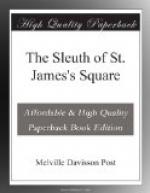“Plutonburg didn’t let St. Alban and the transport go ahead out of the promptings of a noble nature. He did it because he hated England, and he wanted St. Alban to live on in the hell he had trapped him into. He counted on his keeping silent. But the Hun made a mistake.
“St. Alban didn’t measure up to the standard of Prussian egoism by which Plutonburg estimated him.”
Sir Henry continued in the same even voice. The levels of emotion in his narrative did not move him.
“Did you ever see the picture of Plutonburg, in Munich? He had a face like Chemosh. And he dressed the part. Other under-boat commanders wore the conventional naval cap, but Plutonburg always wore a steel helmet with a corrugated earpiece. Some artist under the frightfulness dogma must have designed it for him. It framed his face down to the jaw. The face looked like it was set in iron, and it was a thick-lidded, heavy, menacing face; the sort of face that a broad-line cartoonist gives to a threatening war-joss. At any rate, that’s how the picture presents him. One thinks of Attila under his ox head. You can hardly imagine anything human in it, except a cruel satanic humor.
“He must have looked like Beelzebub that morning, on the transport, when he let St. Alban go on.”
The Baronet looked down at me.
“Now, that’s the truth about the fine conduct of Plutonburg that England applauded as an act of chivalry. It was a piece of sheer, hellish malignity, if there ever was an instance.”
Sir Henry took a turn across the terrace, for a moment silent. Then he went on:
“And in fact, everything in the heroic event on the deck of the transport was a pretense. The Hun didn’t intend to shoot St. Alban. As I have said, Plutonburg had him in just the sort of hell he wanted him in, and he didn’t propose to let him out with a bullet. And St. Alban ought to have known it, unless, as he afterwards said, the whole thing from the first awful moment in the cabin was simply walled out of his consciousness, until he began dimly to realize up there in the sun, in the crowd, that he was being threatened and blurted out his words from a sort of awful disgust.”
Again he paused.
“Plutonburg was right about having St. Alban in the crater of the pit. But he was wrong to measure him by his Prussian standard. St. Alban came on to London. He got the heads of the War Office together and told them. I was there. It was the devil’s own muddle of a contrast. Outside, London was ringing with the man’s striking act of personal heroism. And inside of the Foreign Office three or, four amazed persons were listening to the bitter truth.”
The Baronet spread out his hands with a sudden gesture.
“I shall always remember the man’s strange, livid face; his fingers that jumped about the cuff of his coat sleeve; and his shaking jaw.”
Sir Henry went over and sat down at the table. For a good while he was silent. The sun filtering through the limbs of the great oak-trees made mottled spots on his face. He seemed to turn away from the thing he had been concerned with, and to see something else, something wholly apart and at a distance from St. Alban’s affairs.




